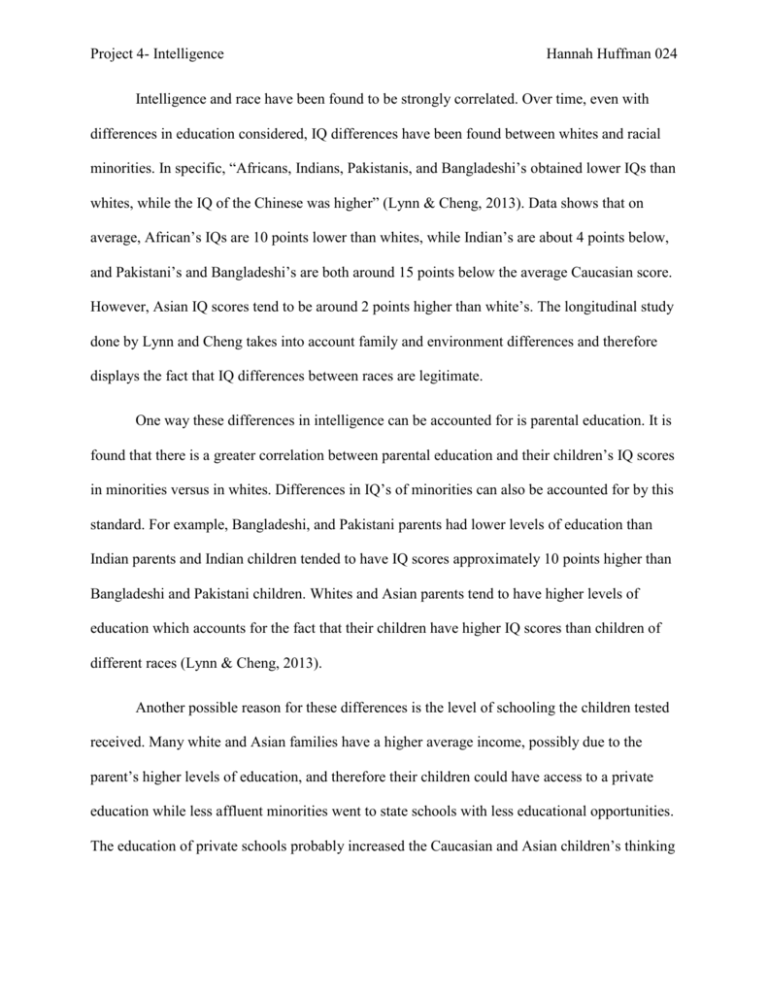Project 4 - WordPress.com
advertisement

Project 4- Intelligence Hannah Huffman 024 Intelligence and race have been found to be strongly correlated. Over time, even with differences in education considered, IQ differences have been found between whites and racial minorities. In specific, “Africans, Indians, Pakistanis, and Bangladeshi’s obtained lower IQs than whites, while the IQ of the Chinese was higher” (Lynn & Cheng, 2013). Data shows that on average, African’s IQs are 10 points lower than whites, while Indian’s are about 4 points below, and Pakistani’s and Bangladeshi’s are both around 15 points below the average Caucasian score. However, Asian IQ scores tend to be around 2 points higher than white’s. The longitudinal study done by Lynn and Cheng takes into account family and environment differences and therefore displays the fact that IQ differences between races are legitimate. One way these differences in intelligence can be accounted for is parental education. It is found that there is a greater correlation between parental education and their children’s IQ scores in minorities versus in whites. Differences in IQ’s of minorities can also be accounted for by this standard. For example, Bangladeshi, and Pakistani parents had lower levels of education than Indian parents and Indian children tended to have IQ scores approximately 10 points higher than Bangladeshi and Pakistani children. Whites and Asian parents tend to have higher levels of education which accounts for the fact that their children have higher IQ scores than children of different races (Lynn & Cheng, 2013). Another possible reason for these differences is the level of schooling the children tested received. Many white and Asian families have a higher average income, possibly due to the parent’s higher levels of education, and therefore their children could have access to a private education while less affluent minorities went to state schools with less educational opportunities. The education of private schools probably increased the Caucasian and Asian children’s thinking Project 4- Intelligence Hannah Huffman 024 and reasoning skills while other minorities do not get this opportunity. Moreover, some claim that teacher prejudice could hinder the learning of some minorities (Lynn & Cheng, 2013). Racial IQ differences can be detrimental if misused by employers, educators, and policy makers. As mentioned earlier, some educators may be prejudiced against minorities, especially after having heard these stats. This could further hinder the learning of minorities. Furthermore, when employers are looking for the best person to fill a position, they may take this data into account and either pass up a good minority candidate based on the fact that statistically he or she may have a lower IQ score, or they may have prejudice when hiring which is morally wrong. Policy makers may misuse this information by feeling as if some minorities are not as intelligent and therefore not as important as whites. This creates both a moral dilemma and social issues. They may create unfair policies which would not be the best approach for a country with many different minorities. Although statistics say that in general, some minority IQ scores are lower, however, there are some individuals this may not apply to that will suffer due to the prejudice created by this study. Although there is data supporting both lower and higher IQ scores based on race, these differences have lessened over time and they are predicted to do so more in the future. Differences in parental education, and the amount of schooling often determined by family income account for these differences and are interesting factors in determining differences in race and intelligence. Project 4- Intelligence Hannah Huffman 024 References Cheng, H., & Lynn, R. (2013). Recent Data for Majority and Racial Minority Differences in Intelligence of 5 Year Olds in the United Kingdom. Intelligence, 41(5).







